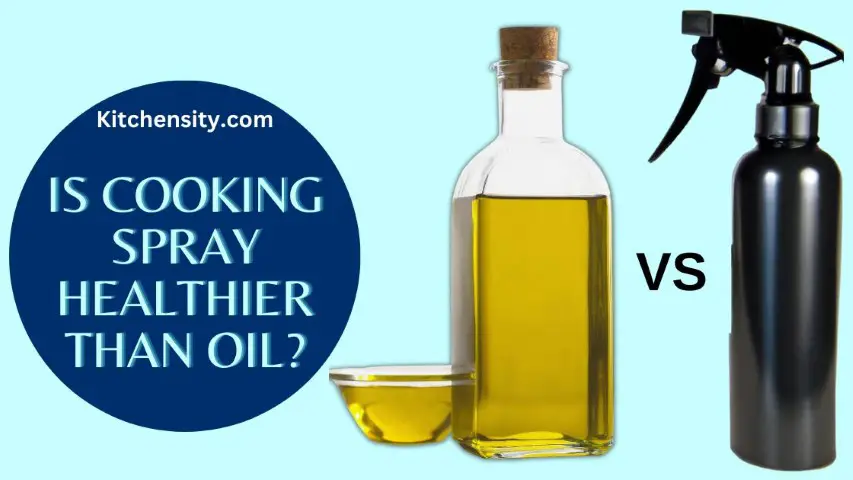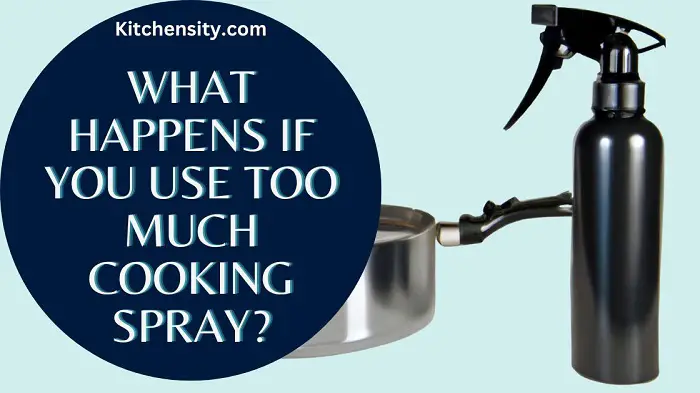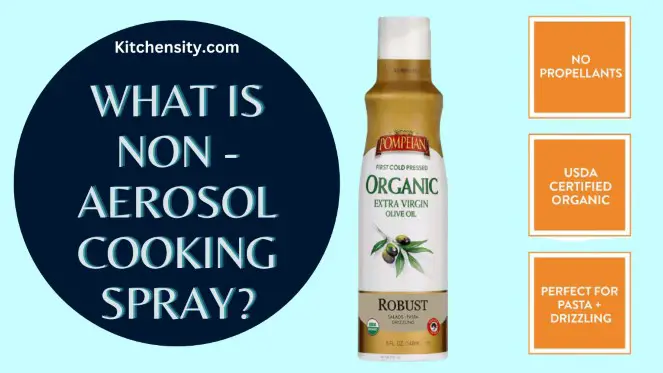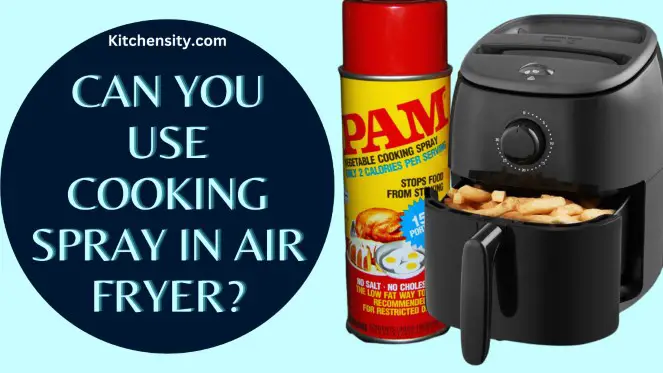Yes, you can use cooking spray on a cast iron skillet but it’s important to use it sparingly and to wipe away any excess oil with a paper towel before cooking and properly clean it after use. This will help prevent residue buildup and ensure that the skillet’s seasoning remains intact.
Cooking sprays such as PAM are safe to use but there are a few factors to consider.
- One is the type of cooking spray being used. Some sprays contain additives like lecithin, which can create a sticky buildup on the skillet over time. Others contain propellants like butane or propane, which can leave a residue on the skillet and impact its seasoning.
- Another factor is the temperature of the skillet. If the skillet is properly preheated before adding food, it should already be hot enough to create a non-stick surface without the need for cooking spray.
- Adding cooking spray to a hot skillet can cause the oil to smoke and burn, which can create a foul taste in the food and damage the skillet’s seasoning.
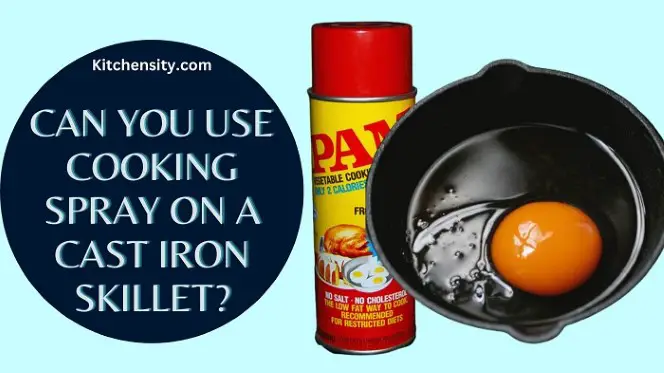
Table of Contents
- 1 Do You Really Need Cooking Spray To Have Nonstick Surface?
- 2 How Should I Apply Cooking Spray To A Cast Iron Skillet?
- 3 Will Using Cooking Spray Affect The Seasoning Of My Cast Iron Skillet?
- 4 Alternative Methods for Prepping Your Cast Iron Skillet.
- 5 Final Thoughts: Can You Use Cooking Spray On A Cast Iron Skillet?
- 6 FAQs (Frequently Asked Questions)
- 6.1 Do You Spray A Cast Iron Skillet Before Cooking?
- 6.2 Do I Need To Season My Cast Iron Skillet?
- 6.3 Can I Use Soap To Clean My Cast Iron Skillet?
- 6.4 Is It Safe To Use Cooking Spray On A Cast Iron Skillet?
- 6.5 Can I Use Any Type Of Cooking Spray On A Cast Iron Skillet?
- 6.6 Do I Need To Reseason My Cast Iron Skillet After Using Cooking Spray?
Do You Really Need Cooking Spray To Have Nonstick Surface?
No, you don’t necessarily need cooking spray to have a nonstick surface on a cast iron skillet. Properly seasoning your cast iron skillet can create a natural nonstick surface. Seasoning involves coating the skillet with a thin layer of oil and heating it to create a polymerized layer that helps prevent food from sticking. With a well-seasoned cast iron skillet and proper cooking techniques, you can cook without using cooking spray and still enjoy a nonstick surface.
If you do choose to use cooking spray on a cast iron skillet, then use a light hand and wipe away any excess oil with a paper towel. Try avoiding sprays that contain propellants or other additives, which can leave a sticky residue on the skillet. If you season the skillet at regular intervals, avoid harsh detergents and abrasive sponges when cleaning it, and store it in a dry place to prevent rust, then it will last for years to come.
Overall, the importance of maintaining a well-seasoned cast iron skillet is to prevent food from sticking and ensure that the skillet lasts long. So, for time-saving if you use cooking spray, then use it sparingly and clean it after use to keep your skillet safe.
Also Read – Does Pam Cooking Spray Contain Butane?
How Should I Apply Cooking Spray To A Cast Iron Skillet?
To apply cooking spray to a cast iron skillet, follow these steps:
- Choose the Right Spray: Use a pump spray bottle with a high smoke point oil, such as vegetable or canola oil. Avoid using aerosol cooking sprays, as they can leave a residue that is difficult to remove.
- Prepare the Skillet: Ensure the skillet is clean and dry. If the skillet is not well-seasoned, you may want to season it before using cooking spray.
- Preheat the Skillet: Place the skillet on the stove over medium heat and allow it to preheat for a few minutes. This will help the oil adhere to the surface.
- Apply the Spray: Hold the spray bottle about 6-8 inches away from the skillet and spray a light, even coating of oil over the cooking surface. Be careful not to overspray, as this can lead to excess oil and uneven cooking.
- Spread the Oil: Use a paper towel or a brush to spread the oil evenly across the cooking surface and along the sides of the skillet.
- Cook as Desired: Once the skillet is evenly coated with oil, you can start cooking your food. Adjust the heat as needed to prevent the oil from smoking.
- Clean the Skillet: After cooking, clean the skillet according to the manufacturer’s instructions. If there is any residue from the cooking spray, use a gentle scrub brush or sponge to remove it.
- Reapply as Needed: Depending on the length of your cooking session, you may need to reapply cooking spray to prevent sticking. Repeat the process as necessary.
Also Read – What Happens If You Use Too Much Cooking Spray?
Will Using Cooking Spray Affect The Seasoning Of My Cast Iron Skillet?
Using cooking spray on a cast iron skillet should not significantly affect the seasoning if done properly. It’s important to use cooking spray sparingly and to avoid aerosol cooking sprays, as they can leave a residue that is difficult to remove. Instead, use a pump spray bottle with a high smoke point oil, such as vegetable or canola oil, to lightly coat the skillet before cooking.
If you notice any buildup or residue from the cooking spray, it’s a good idea to clean the skillet and reseason it to maintain its nonstick properties. Overall, as long as you use cooking spray in moderation and properly maintain your cast iron skillet, it should not negatively impact the seasoning.
Also Read – Is Cooking Spray Healthier Than Oil?
Alternative Methods for Prepping Your Cast Iron Skillet.
- Use a brush or paper towel to apply a thin layer of oil: Before cooking, use a brush or paper towel to apply a thin layer of oil to your cast iron skillet. This will help to prevent sticking without creating a gunky surface.
- Use the right temperature: To prevent sticking, it’s important to use the right temperature when cooking with cast iron. Start by heating your pan over medium heat and gradually increasing the temperature if needed.
- Seasoning: Regularly seasoning your cast iron skillet helps create a natural nonstick surface. To season, coat the skillet with a thin layer of oil and bake it in the oven at a high temperature.
- Clean your skillet properly: To maintain the non-stick surface of your cast iron skillet, it’s important to clean it properly. Avoid using soap or abrasive scrubbers, as these can damage the seasoning. Instead, use hot water and a gentle scrubber to remove any food residue.
Also Read – How To Clean And Season Cast Iron Cookware?
Final Thoughts: Can You Use Cooking Spray On A Cast Iron Skillet?
Ultimately, the decision of whether or not to use cooking spray on a cast iron skillet is a personal one. Some people find it helpful, while others prefer to rely on the skillet’s natural non-stick properties. Experimenting with different cooking methods and techniques can help you determine what works best for you and your cast iron skillet.
If you do decide to use cooking spray on a cast iron skillet, it’s important to use it sparingly and to wipe away any excess oil with a paper towel before cooking. This will help prevent residue buildup and ensure that the skillet’s seasoning remains intact.
Also Read – What Pans Can You Use Cooking Spray On?
FAQs (Frequently Asked Questions)
-
Do You Spray A Cast Iron Skillet Before Cooking?
Yes, you can spray a cast iron skillet with a light coating of cooking spray before cooking, but it’s not always necessary. If your skillet is well-seasoned, you may find that you don’t need to use cooking spray at all. However, if you’re cooking foods that are prone to sticking or if you want to add some extra flavor, you can use a small amount of cooking spray.
-
Do I Need To Season My Cast Iron Skillet?
Yes, seasoning your cast iron skillet is important to maintain its nonstick surface and prevent rusting. Seasoning involves coating the skillet with a thin layer of oil and baking it at a high temperature. This process creates a polymerized layer on the surface of the skillet that helps prevent food from sticking.
-
Can I Use Soap To Clean My Cast Iron Skillet?
Yes, you can use a small amount of mild dish soap to clean your cast iron skillet. Contrary to popular belief, using soap will not remove the seasoning from your skillet if done occasionally and with a gentle touch. After washing with soap, be sure to dry the skillet thoroughly and apply a thin layer of oil to protect the seasoning.
-
Is It Safe To Use Cooking Spray On A Cast Iron Skillet?
Yes, it is generally safe to use cooking spray on a cast iron skillet. However, it’s important to use it sparingly and to avoid aerosol cooking sprays, as they can leave a residue that is difficult to remove. Instead, use a pump spray bottle with a high smoke point oil, such as vegetable or canola oil, to lightly coat the skillet before cooking.
-
Can I Use Any Type Of Cooking Spray On A Cast Iron Skillet?
It’s best to use a pump spray bottle with a high smoke point oil, such as vegetable or canola oil, on a cast iron skillet. Avoid using aerosol cooking sprays, as they can leave a residue that is difficult to remove and may contain additives that can harm the seasoning of the skillet.
-
Do I Need To Reseason My Cast Iron Skillet After Using Cooking Spray?
Using cooking spray on a cast iron skillet should not significantly affect the seasoning. However, if you notice any buildup or residue from the spray, it’s a good idea to clean the skillet and reseason it to maintain its nonstick properties.
Katrina Smith is a seasoned expert with over 25 years of experience in all things related to cooking and the kitchen. As an avid cook and kitchen enthusiast, she is passionate about sharing her knowledge and expertise on cookware, kitchen appliances, kitchen tips, and kitchen staples.
Through her articles and reviews, Katrina aims to inspire and help others improve their cooking skills, experiment with different ingredients, and invest in quality cookware and appliances.

